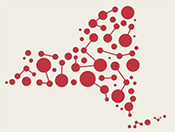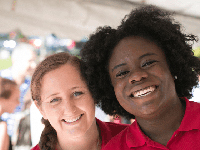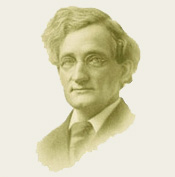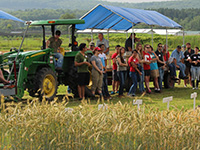Home | Unit 3
Overview
Through facilitator/interviewee role-playing, youth will observe effective techniques and use this real-world practice opportunity to begin crafting thought-provoking questions for the video project in this unit.
Skill Level
Intermediate/Advanced; Beginner level with adult assistance
Learner Outcomes, Youth will:
- Relate existing knowledge about climate change action practices
- Utilize interviewing skills to access and assess information
- Apply critical thinking skills to identify a problem and pose questions for investigation
- Create interview questions that demonstrate and inspire others to adopt climate change action practices
Education Standard
NL-ENG.K-12.8 Developing Research Skills: Gather and synthesize information to create and communicate knowledge.
Success Indicators
Identify and demonstrate how others embrace climate change mitigation practices.
Life Skills
Marketable /useful skills, cooperation, communication
Time Needed
30 minutes for on-site interview, independent activity time for participants to develop a series of interview questions
Materials List: ‘Interview Questions Form’ template, one per participant, photo release and other participation and travel forms.
Youth Handout
Space
This is a site visit in the community.
Suggested Group Size
12-15 or more
Introduction
After completing activity 3.2 Peer Interview Practice, the facilitator or group leader will set up a site visit for the group to observe an interview with someone doing amazing work in the community. Through facilitator/interviewee role-playing, youth will observe effective techniques and use this real-world practice opportunity to begin crafting thought-provoking questions for the video project in the next activity, 3.4 Community Heroes.
Opening Questions
- What in this interview inspired you? Why?
- Are you and others you know inspired to take action in a similar way? What might that look like?
- Reflecting on what you’ve observed and imagining your way into creating your own interview questions, what and who would you feature?
- Who in your community is making a difference in doing something about climate change? How might you find out?
- What questions would you ask those in your community you will interview for the video?
- How will you know if your video has inspired others to action?
Background Information
Before the Activity
The facilitator will seek out someone in the community who is willing to participate in a role-playing interview and can demonstrate how they are working to combat climate change. Set up a time and place for a site visit, arrangements for the group to meet at the site, a place where the group can observe an interview led by the facilitator with the community member. Consider someone who might:
- Reduce their carbon print by eliminating large amounts of trash. Everything that needs to be discarded is composted, recycled, reused or repurposed.
- Someone on a civic committee who has planted trees to green the community.
- An organic gardener who grows their own food on every inch of their property, without the use of chemicals or pesticides.
Prepare a set of interview questions to share with youth as examples of effective questions to use when they prepare interview question for the next activity in this unit.
Let’s Do It!
Before the site visit
Explain to youth that they will be doing a site visit, meeting out in the community to observe a role-played interview with someone doing amazing things. Youth will use this opportunity to consider and practice thought provoking questions for their interview in the next activity, 3.4 Community Heroes.
Share these effective interview practices:
- Interview questions that are simple, yet so open as to take an interviewee down a rich path. What surprised you? What inspired you? What was easy? What was hard? What did you hope to achieve? What would you like to happen next? What obstacles did you face? What’s helping you? What could you do next?
- Avoiding interrogative words. The most powerful questions are expansive and seek to raise awareness, using words such as what, when, who, how much and how many. On the other hand, whyimplies criticism and provokes defensiveness. Shifting from why did you do that? to what were the factors that led to that decision? changes the question entirely.
- Stay with the person’s language and echo words the person is using, not what you think they might or should be feeling. You said this was an impossible situation - could you say more about what this means to you? What do you mean when you said you felt frustrated?
- Avoid questions with right/wrong, yes/no responses.
After the site visit: Talk It Over
- Explain that it is now their turn to find someone in their community who they can interview about the remarkable things they are doing to fight climate change.
- Instruct them to identify a subject to interview and craft a series of interview questions using the “Interview Questions Form” before the next session meeting.
- Remind youth about the effective interview practices shared before the site visit.
- Generalize: What are the big and small changes people interviewed in the videos have accomplished?
Apply
- How do you see yourself taking action in the same way the leaders in your community are?
- What ways can you continue showing others in your community how to take action?
- What are some actions you will take today to mitigate climate change?









